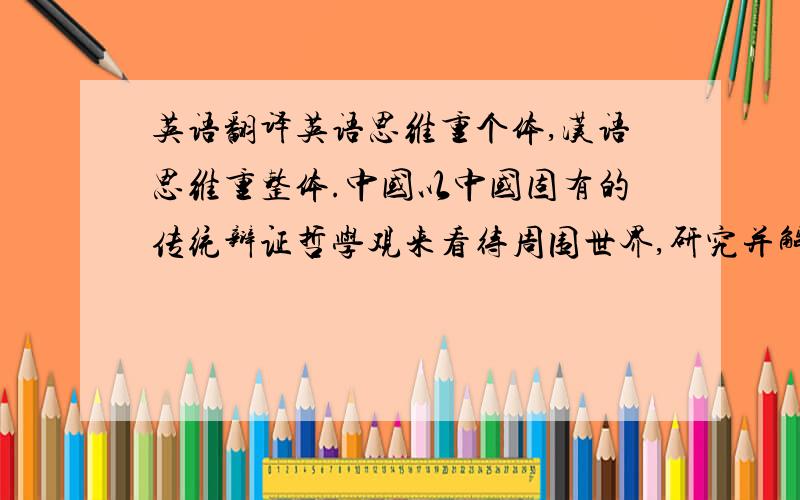英语翻译英语思维重个体,汉语思维重整体.中国以中国固有的传统辩证哲学观来看待周围世界,研究并解决问题,强调从整体出发,辩证地看待一切;而英文化源自古希腊、罗马文化,又历经工业革
来源:学生作业帮助网 编辑:作业帮 时间:2024/11/29 22:18:59

英语翻译英语思维重个体,汉语思维重整体.中国以中国固有的传统辩证哲学观来看待周围世界,研究并解决问题,强调从整体出发,辩证地看待一切;而英文化源自古希腊、罗马文化,又历经工业革
英语翻译
英语思维重个体,汉语思维重整体.中国以中国固有的传统辩证哲学观来看待周围世界,研究并解决问题,强调从整体出发,辩证地看待一切;而英文化源自古希腊、罗马文化,又历经工业革命,强调以个体为中心,重视个人发展,从而形成了看问题个体性很强的倾向.因此英语民族的思维是个体的、独特的,而中国人则注重整体、综合和概括思维.思维方式上的差异表现在语言上就是:英语喜欢用具体细腻的词,具有明显的词形变化,形式多样的语法形式,组词造句中的语序结构也较为灵活; 而汉语则更偏爱概括模糊的词,无词形变化,语法形式的表达主要依靠词汇手段,组词造句完全依据语义逻辑,动作发生的时间先后决定词语和分句的排列顺序.
英语思维重客体,汉语思维重主体.中国哲学强调悟性,强调天人合一,人与客观世界你中有我,我中有你.主张人对自然、社会的参与,主体介入客体,客体融入主体.因此中国传统思维方式体现了强烈的主客体统一意识.这种意识在语言上体现为:汉语倾向从自我出发来叙述客观事物,因而汉语较常用人称主语表达.而英语民族由于受亚里士多德的形式逻辑和理性主义的影响,强调理性,强调主体与客体的物我二分,主客分明,并追求超越于现实世界之上的最高存在.在语言上则体现为主语的客观性,句子常以物体、 抽象概念、 抽象名词作主语.表现在句子上多使用不能实施动作或表示无生命事物的名词 ( 非人称 impersonal) 做主语,强调主语“物”的重要性,广泛地使用被动语态,尤其在科技文体中.英语重直线思维,汉语重曲线思维.
中国人的思维特点是直观的、综合的和整体的,强调内部和外部世界、主客观的整体性.具体说来,中国人的逻辑思维一般是“螺旋式的”.思维活动大多是螺旋式地绕圈向前发展,把作出的判断或推理的结果,以总结的方式安排在结尾.这种螺旋式的逻辑使得中国人利用间接的交流方式,在语言表达上,一般是首先叙述事情的背景,或罗列客观上的条件,或说明问题的原因,或摆出事实的证据,最后再做出结论,说明自己的观点或看法.也就是说中国人习惯将次要信息摆在句首 ( 如状语或其他叙述部分 ),先将外围环境,时间背景一一交代周到,最后画龙点睛,道出话语信息的中心部分或表态部分.而英语民族的思维方式的特点是逻辑的、分析的和推理的.具体地说,英美人的思维方式是“线性的”,往往采用直线推进的方式.这种“线形的”逻辑方式使得西方人采用直接交流 (直截了当)的形式.在语言表达上,他们习惯首先说明看法或观点,点明主题,然后再依次说明背景、条件、原因、证据或进行分析.因此英语句子的主谓机制一般位于句首,开门见山,提出重要信息,然后用各种标志进行补述、修饰、 限制.
英语翻译英语思维重个体,汉语思维重整体.中国以中国固有的传统辩证哲学观来看待周围世界,研究并解决问题,强调从整体出发,辩证地看待一切;而英文化源自古希腊、罗马文化,又历经工业革
你好!我是大学外语老师!我来帮助你!
English thinking heavy thinking in Chinese individuals, heavy whole. China to the traditional Chinese dialectic philosophy around to look at the world, study and solve problems, departure from the whole stress from dialectical at all; And the English culture derived from the ancient Greek, Roman culture, and after the industrial revolution, emphasizing on the individual as the center, pay attention to individual development, and thus formed the tendency of strong individuality to see a problem. So English national thinking is individual and unique, but Chinese is pay attention to integral, synthesized and summarized thinking. The thinking mode of the difference is in the language is English with specific exquisite: like the word, has distinct morphological change, the various forms of grammar form, the sequence of sentence structure and a more flexible; And Chinese is a preference for general vague word, no morphological change, grammar form of expression mainly rely on vocabulary, sentence means of all based on semantic logic, action happens time has decided to words and the order of the clauses.
English thinking heavy object, thinking in Chinese heavy subject. Chinese philosophy emphasizes understanding, emphasize the harmony between man and nature, man and the objective world NiZhongYouWo me in you, there are you. Claims of natural, social participation, object, the object into the intervention subject. Therefore the Chinese traditional thinking mode which embodies a strong unity consciousness of subject and object. This kind of consciousness in language reflects in: Chinese tendency starting from self narrative is objective things and therefore Chinese less commonly used expression said subject. And by the English people in the form of Aristotle's logic and rationalism, emphasize the influence of rational, emphasize the subject and object of dichotomy between things I, clear, and pursuit of real world beyond the highest existence above. The language is mainly reflect the objectivity of the language, the sentence is often objects, abstract concept, an abstract noun as the subject. Performance on the use in a sentence could not be implemented action or the things said inanimate noun (the person) do the subject, and impersonal emphasized the importance of "the thing" subject, widely use the passive, especially in science and technology in style. English heavy thinking straight Chinese by curve thinking.
Chinese think characteristic is intuitive, comprehensive and whole, emphasize the outer and inner world, the whole of the subjective and objective. In practical terms, the Chinese logic thinking is generally "spiral". Thinking activity is mostly a spiral around the forward development, a judgment or reasoning results, in a summarized means arrangement in the end. The spiral logic made the Chinese use indirect way of communication, in the language expression, general is described the background of the first things, or list of conditions, or objectively that the cause of the problem, or the facts of evidence, and finally to make conclusions, illustrated his idea or opinion. That is the Chinese habit will secondary information in the sentence first (such as adverbials or other narrative part), first the periphery environment, one time background, and finally make the finishing point, thoughtful explain what the central part of discourse information or takes a part. And the English national way of thinking is characteristic of the logic, the analysis and reasoning. To be specific, British and American people's way of thinking is linear, "" often USES the straight line way forward. This "linear" logical way westerners are use direct exchange (straightforward) form. In linguistic expressions, they used to show how the view or view, point out, and then that in turn theme background, conditions, cause, evidence or analysis. Therefore the Lord of the English sentences "in the sentence first, general mechanism to come straight to the point, important information, and then put forward with all kinds of symbols of added, modify, restrict.